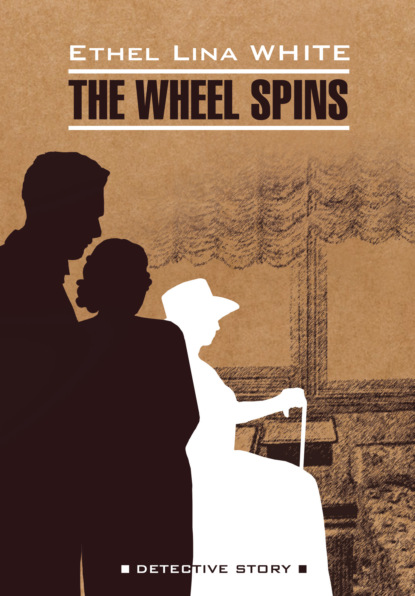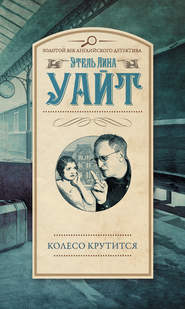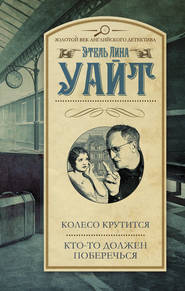По всем вопросам обращайтесь на: info@litportal.ru
(©) 2003-2024.
✖
Колесо крутится. Леди исчезает / The Wheel Spins. The Lady Vanishe
Настройки чтения
Размер шрифта
Высота строк
Поля
Her resolution did not save her from increasing discomfort. The carriage seemed not only stuffy, but oppressive with black widow’s personality. Iris felt positive that she was a clotted mass of prejudices – an obstruction in the healthy life-stream of the community. Her type was always a clog on progress.
As her face grew damp, she looked toward the closed windows of the compartment. The corridor-end, where she sat, was too crowded to admit any of the outer air, so she struggled to her feet and caught the other strap.
“Do you mind?” she asked with stressed courtesy, hoping, from her intonation, that the other passengers would grasp the fact that she was asking their permission before letting down the glass.
As she expected, the man of the family party rose and took the strap from her. Instead of finishing the job, however, he glanced respectfully at the personage, as though she were sacrosanct, and then frowned at Iris, shaking his head the while.
Feeling furious at the opposition, Iris returned to her corner.
“I’ve got to take it,” she thought. “Take it on the chin. I’m the outsider here.”
It was another novel sensation for the most popular member of the crowd, to be in a minority. Besides having to endure the lack of ventilation, the inability to explain her actions, or express a wish, gave her the stunted sense of being deprived of two faculties – speech and hearing.
Presently the door was opened and a tall man squeezed into the carriage. Although she realised that her feelings had grown super-sensitive, Iris thought she had never seen a more repulsive face. He was pallid as potter’s clay, with dead dark eyes, and a black spade beard.
He bowed to the personage and began to talk to her, standing the while. His story was evidently interesting, for Iris noticed that the other passengers, including the child, were all listening with close interest.
As he was speaking, his glasses flashed round the compartment, and finally rested on her. His glance was penetrating, yet impersonal, as though she were a specimen on a microscope-slide. Yet, somehow, she received the impression that she was not a welcome specimen, nor one that he had expected to see.
Stooping so that his lips were on a level with the personage’s ear, he asked a low-toned question. She replied in a whisper, so that Iris was reminded of two blowflies buzzing in a bottle.
“Am I imagining things, or do these people really dislike me?” she wondered.
She knew that she was growing obsessed by this impression of a general and secret hostility. It was manifestly absurd, especially as the man with the black spade beard had not seen her before. She had merely inconvenienced some strangers, from whom she was divided by the barrier of language.
Shutting her eyes, she tried to forget the people in the carriage. Yet the presence of the man continued to affect her with discomfort. His white face seemed to break through her closed lids, and float in the air before her.
It was a great relief when the buzzing ceased and she heard him go out of the compartment. Directly he had left, she grew normal again, and was chiefly conscious of a very bad headache. The most important things in life were tea and cigarettes; yet she dared not smoke because of the threat of sickness, while tea seemed a feature of a lost civilisation. The train was now rushing through a deserted country of rock and pine. The nearest reminder of habitation was an occasional castle of great antiquity, and usually in ruins. As she was gazing out at the fantastic scenery, an official poked his head in at the door and shouted something which sounded like blasphemy.
The other passengers listened in apathy, but Iris began to open her bag, in case tickets or passport were required. As she did so, she was amazed to hear a crisp English voice.
The tweed spinster had risen from her seat and was asking her a question.
“Are you coming to the restaurant-car to get tea?”
Chapter eight. Tea-interval
Iris was too stunned with surprise to reply. She looked incredulously at the sandy, spiny stretches, flowing past the window, as though expecting to see them turn to Swiss chalets, or blue Italian lakes.
“Oh,” she gasped, “you’re English.”
“Of course. I thought I looked typical… Are you coming to tea?”
“Oh, yes.”
As Iris followed her guide out of the carriage, she was rather disconcerted to find that their compartment was at the end of the corridor. It looked as though her protective square had not insured her against railway smashes, after all.
“Are we next to the engine?” she asked.
“Oh, no,” the tweed lady assured her. “There are ordinary coaches in between. It’s an extra long train, because of the end of the season rush. They had to pack them in with a shoe-horn.”
Apparently she was the type that collected information, for she began to broadcast almost immediately.
“Just glance at the next carriage to ours as you go by – and I’ll tell you something.”
Although Iris felt no curiosity, she obeyed. Afterwards she was sorry, because she could not forget what she saw.
A rigid figure, covered with rugs, lay stretched on the length of one seat. It was impossible to tell whether it were a man or a woman, for head, eyes and forehead were bandaged, and the features concealed by a criss-cross of plaster strips. Apparently the face had been gashed to mutilation-point.
Iris recoiled in horror, which was increased when she realised that the pallid man with the spade beard was in charge of the invalid. Beside him was a nun, whose expression was so callous that it was difficult to connect her with any act of mercy.
While they chatted together, the patient feebly raised one hand. Although they saw the movement, they ignored it. They might have been porters, responsible for the transport of a bit of lumber, instead of a suffering human being.
The fluttering fingers affected Iris with a rush of acute sympathy. She shrank from the thought that – had the cards fallen otherwise – she, too, might be lying, neglected by some indifferent stranger.
“That nun looks a criminal,” she whispered.
“She’s not a nun,” the tweed lady informed her, “she’s a nursing-sister.”
“Then I pity her patient. Ghastly to be ill on a journey. And she’s not a spectacle. Why can’t they pull down the blind?”
“It would be dull for them.”
“Poor devil. I suppose it’s a man?”
Iris was so foolishly anxious to break the parallel between the motionless figure and herself, that she was disappointed when her companion shook her head.
“No, a woman. They got in at our station, higher up. The doctor was telling the baroness about it. She’s just been terribly injured in a motor smash, and there’s risk of serious brain injury. So the doctor’s rushing her to Trieste, for tricky operation. It’s a desperate chance to save her reason and her life.”
As her face grew damp, she looked toward the closed windows of the compartment. The corridor-end, where she sat, was too crowded to admit any of the outer air, so she struggled to her feet and caught the other strap.
“Do you mind?” she asked with stressed courtesy, hoping, from her intonation, that the other passengers would grasp the fact that she was asking their permission before letting down the glass.
As she expected, the man of the family party rose and took the strap from her. Instead of finishing the job, however, he glanced respectfully at the personage, as though she were sacrosanct, and then frowned at Iris, shaking his head the while.
Feeling furious at the opposition, Iris returned to her corner.
“I’ve got to take it,” she thought. “Take it on the chin. I’m the outsider here.”
It was another novel sensation for the most popular member of the crowd, to be in a minority. Besides having to endure the lack of ventilation, the inability to explain her actions, or express a wish, gave her the stunted sense of being deprived of two faculties – speech and hearing.
Presently the door was opened and a tall man squeezed into the carriage. Although she realised that her feelings had grown super-sensitive, Iris thought she had never seen a more repulsive face. He was pallid as potter’s clay, with dead dark eyes, and a black spade beard.
He bowed to the personage and began to talk to her, standing the while. His story was evidently interesting, for Iris noticed that the other passengers, including the child, were all listening with close interest.
As he was speaking, his glasses flashed round the compartment, and finally rested on her. His glance was penetrating, yet impersonal, as though she were a specimen on a microscope-slide. Yet, somehow, she received the impression that she was not a welcome specimen, nor one that he had expected to see.
Stooping so that his lips were on a level with the personage’s ear, he asked a low-toned question. She replied in a whisper, so that Iris was reminded of two blowflies buzzing in a bottle.
“Am I imagining things, or do these people really dislike me?” she wondered.
She knew that she was growing obsessed by this impression of a general and secret hostility. It was manifestly absurd, especially as the man with the black spade beard had not seen her before. She had merely inconvenienced some strangers, from whom she was divided by the barrier of language.
Shutting her eyes, she tried to forget the people in the carriage. Yet the presence of the man continued to affect her with discomfort. His white face seemed to break through her closed lids, and float in the air before her.
It was a great relief when the buzzing ceased and she heard him go out of the compartment. Directly he had left, she grew normal again, and was chiefly conscious of a very bad headache. The most important things in life were tea and cigarettes; yet she dared not smoke because of the threat of sickness, while tea seemed a feature of a lost civilisation. The train was now rushing through a deserted country of rock and pine. The nearest reminder of habitation was an occasional castle of great antiquity, and usually in ruins. As she was gazing out at the fantastic scenery, an official poked his head in at the door and shouted something which sounded like blasphemy.
The other passengers listened in apathy, but Iris began to open her bag, in case tickets or passport were required. As she did so, she was amazed to hear a crisp English voice.
The tweed spinster had risen from her seat and was asking her a question.
“Are you coming to the restaurant-car to get tea?”
Chapter eight. Tea-interval
Iris was too stunned with surprise to reply. She looked incredulously at the sandy, spiny stretches, flowing past the window, as though expecting to see them turn to Swiss chalets, or blue Italian lakes.
“Oh,” she gasped, “you’re English.”
“Of course. I thought I looked typical… Are you coming to tea?”
“Oh, yes.”
As Iris followed her guide out of the carriage, she was rather disconcerted to find that their compartment was at the end of the corridor. It looked as though her protective square had not insured her against railway smashes, after all.
“Are we next to the engine?” she asked.
“Oh, no,” the tweed lady assured her. “There are ordinary coaches in between. It’s an extra long train, because of the end of the season rush. They had to pack them in with a shoe-horn.”
Apparently she was the type that collected information, for she began to broadcast almost immediately.
“Just glance at the next carriage to ours as you go by – and I’ll tell you something.”
Although Iris felt no curiosity, she obeyed. Afterwards she was sorry, because she could not forget what she saw.
A rigid figure, covered with rugs, lay stretched on the length of one seat. It was impossible to tell whether it were a man or a woman, for head, eyes and forehead were bandaged, and the features concealed by a criss-cross of plaster strips. Apparently the face had been gashed to mutilation-point.
Iris recoiled in horror, which was increased when she realised that the pallid man with the spade beard was in charge of the invalid. Beside him was a nun, whose expression was so callous that it was difficult to connect her with any act of mercy.
While they chatted together, the patient feebly raised one hand. Although they saw the movement, they ignored it. They might have been porters, responsible for the transport of a bit of lumber, instead of a suffering human being.
The fluttering fingers affected Iris with a rush of acute sympathy. She shrank from the thought that – had the cards fallen otherwise – she, too, might be lying, neglected by some indifferent stranger.
“That nun looks a criminal,” she whispered.
“She’s not a nun,” the tweed lady informed her, “she’s a nursing-sister.”
“Then I pity her patient. Ghastly to be ill on a journey. And she’s not a spectacle. Why can’t they pull down the blind?”
“It would be dull for them.”
“Poor devil. I suppose it’s a man?”
Iris was so foolishly anxious to break the parallel between the motionless figure and herself, that she was disappointed when her companion shook her head.
“No, a woman. They got in at our station, higher up. The doctor was telling the baroness about it. She’s just been terribly injured in a motor smash, and there’s risk of serious brain injury. So the doctor’s rushing her to Trieste, for tricky operation. It’s a desperate chance to save her reason and her life.”
Вы ознакомились с фрагментом книги.
Приобретайте полный текст книги у нашего партнера:
Приобретайте полный текст книги у нашего партнера:









